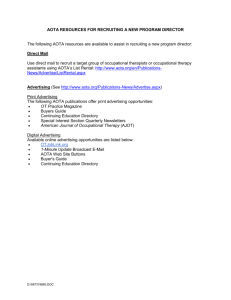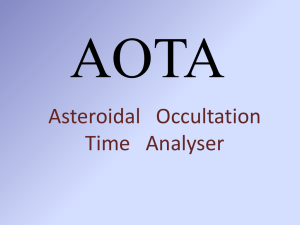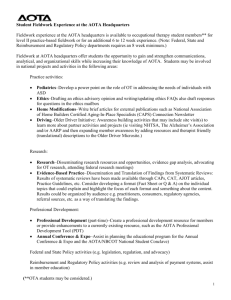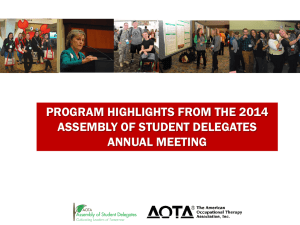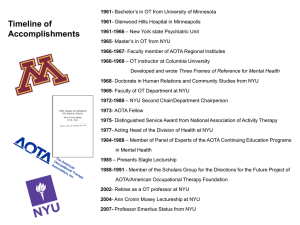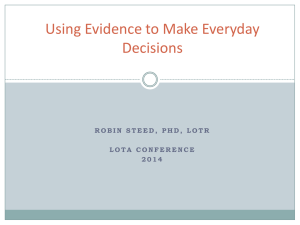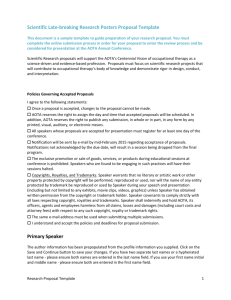2015 Assembly of Student Delegates Annual Meeting
advertisement
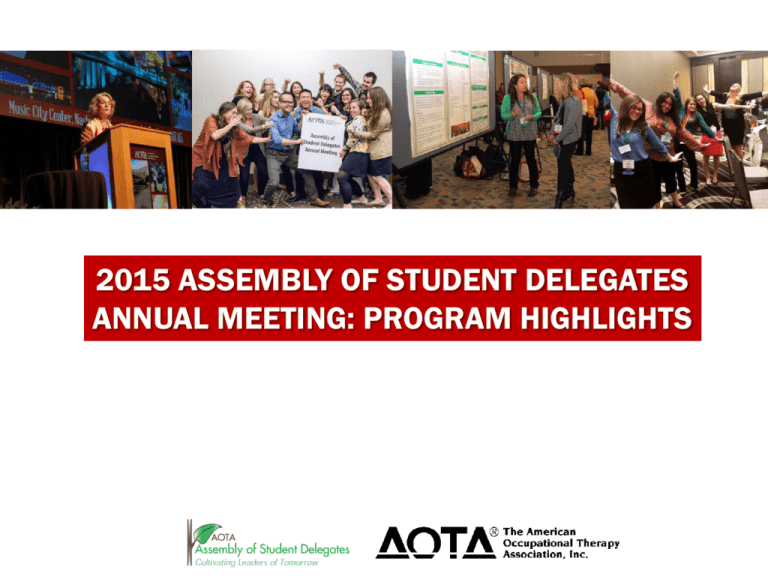
2015 ASSEMBLY OF STUDENT DELEGATES ANNUAL MEETING: PROGRAM HIGHLIGHTS ASD Annual Meeting • The mission of the Assembly of Student Delegates is to support student members of AOTA by communicating their interests and advancing their professional contributions. • This Assembly promotes Association membership and provides a forum for the development of student leadership and political awareness to enhance the viability of the profession. • Annually, ASD representatives from OT and OTA educational programs across the country meet to represent their schools at the ASD Annual Meeting. Student Opportunities and Resources Assembly of Student Delegates Steering Committee • Boardroom to Classroom – One-hour teleconference between students and a member of AOTA’s Board of Directors to increase knowledge about professional issues and opportunities. • Outstanding Student Advocacy Award – New AOTA Award that will be open for nominations for one OT or OTA student or student group in fall of 2015. • Assembly of Student Delegates Steering Committee Elections – All students are encouraged to apply, not just ASD Representatives. – Open for nominations in early September. – Open positions: OT Vice Chairperson, OTA Vice Chairperson, Student Rep to the Commission on Education, Student Rep to the Representative Assembly (2-year terms) • Student Occupational Therapy Association Handbook – Tips on how to develop and strengthen your SOTA, including best practices on running a meeting, elections, officer positions, advocacy, fundraising, community service, professional development opportunities, and more. Student Opportunities and Resources • Assembly of Student Delegates Steering Committee Student Membership Circle – Benefits program to support and recognize student membership initiatives: • Gold Level: 100% AOTA Student Membership • Silver Level: 80% AOTA Student Membership • Bronze Level: 75% AOTA Student Membership – Benefits include acknowledgement in AOTA publications and website, special privileges and acknowledgment at Annual Conference, entry into a $250 award raffle, and one free student registration at Conference (programs with 100% AOTA membership). – Applications due late October 2015. • AOTA/NBCOT National Student Conclave – November 13-14, 2015 – Valley Forge (Suburban Philadelphia), Pennsylvania – Registration will open in summer of 2015. • OT Student Pulse – Monthly e-newsletter available to AOTA student members – Students are encouraged to submit article ideas. Student Opportunities and Resources Assembly of Student Delegates Steering Committee • COOL Database – Create a personal volunteer profile and you will be contacted by AOTA staff if volunteer opportunities arise that match your areas of interest, years of experience, and amount of time you have available for volunteering. • Scholarships – AOTF Scholarship Program • Over 50 AOTF and state scholarships ranging in value from $150 to $5,000 are open for applications each fall. – E.K. Wise Scholarship • Three awards granted in the amount of $2,500 to support students from diverse backgrounds; application deadline is May 5, 2015. • Emerging Leaders Development Program – Leadership development program that includes training, ongoing mentorship, and participation in current service opportunities that match each participant’s own leadership goals; applications due May 11, 2015. AOTA's NBCOT® Exam Prep Caroline Polk, MS, AOTA Digital Manager and AJOT Managing Editor Contents of AOTA’s NBCOT® Exam Prep • Online practice tests for OTR® and COTA® examinations: • 937 OTR® questions • 77 OTR® clinical simulations • 690 COTA® questions. • Topic outlines for 19 topics. • Handouts with Testing Tips and information about the NBCOT® exams. Features • Includes retired COTA® and OTR® questions and other questions written by board members with experience writing NBCOT® items. • Provides tool for tracking progress, including strengths and weaknesses. • Practice tests can be customized to users’ needs. • Explanations for correct and incorrect answers are provided. • Offers timed and untimed options (exam and practice modes). Join AOTA’s Exam Prep Info Center Facebook group to share tips, offer support, and ask questions. Multicultural Diversity Initiative (MDI) Network Hector L. Borrero, MBA, OTR/L, CAPS, Multicultural Diversity and Inclusion Chairperson • The Multicultural, Diversity, and Inclusion (MDI) Network is made up of independent groups that support the profession’s goal to increase diversity and inclusion. • Multicultural Networking Groups – Asian/Pacific Heritage Occupational Therapy Association (APHOTA) – National Black Occupational Therapy Caucus (NBOTC) – Network for Lesbian, Gay, Bisexual, and Transgender Concerns in Occupational Therapy (The Network) – Occupational Therapy Network for Native Americans (OTNA) – Network for Occupational Therapy Practitioners with Disabilities and Their Supporters (NOTPD) – Orthodox Jewish Occupational Therapy Chavursa (OJOTC) – Terapia Ocupacional para Diversidad, Oportunidad y Solidaridad (TODOS) Network of Hispanic Practitioners • MDI Tool Kits provide resources for understanding the specific values, norms, beliefs, attitudes, and behaviors associated with different cultural groups. Multicultural Diversity Initiative (MDI) Network (continued) Hector L. Borrero, MBA, OTR/L, CAPS, Multicultural Diversity and Inclusion Chairperson Students’ Role in the MDI Network • Advocate for diversity and inclusion among peers, classmates, and friends at educational institutions. • Encourage your peers to join the network that meets their needs. AOTA’s Special Interest Sections and You! Donna Costa, DHS, OTR/L, FAOTA, SIS Council Chairperson • AOTA's Special Interest Sections (SISs) support the needs of members, focusing on specific areas of practice while recognizing that the integration of various interests defines our practice. • SISs connect with members through Quarterly Newsletters, discussion forums, and professional networking communities. Special Interest Sections (SISs) Administration & Management SIS Developmental Disabilities SIS Education SIS Early Intervention & School SIS Gerontology SIS Home & Community Health SIS Mental Health SIS Physical Disabilities SIS Sensory Integration SIS Technology SIS Work & Industry SIS AOTA’s Special Interest Sections and You! (continued) Donna Costa, DHS, OTR/L, FAOTA, SIS Council Chairperson Joining Special Interest Sections • • • When you join AOTA, your membership allows you to join three SIS groups; one of these is primary and you receive that SIS Quarterly Newsletter in the mail. Your membership gives you access to all 11 SIS Quarterly Newsletters online. You also have voting rights in your primary SIS. How to Get Involved as a Student • • • • Contribute to OT Connections SIS forums. Contact your SIS of interest and volunteer. Read the Quarterly Newsletters. Apply to become a student intern. Cultivating Leaders of Tomorrow: Building Capacity and Creating Our Collective Futures Virginia (Ginny) Stoffel, PhD, OT, BCMH, FAOTA, AOTA President • Engagement: Be a model of professional engagement. • Exploration: Opportunities for leadership are wide open--find your passion, stretch your skills. The sky’s the limit! • Empowerment: Know that we need your voice and action. • Servant leadership is serving to lead and leading to serve: – Building capacity in self – Building capacity in others – Building capacity in organizations Updates on the Entry-Level Doctorate Dialogue Virginia (Ginny) Stoffel, PhD, OT, BCMH, FAOTA, AOTA President • In response to the changing demands of higher education, the health care environment, and within occupational therapy, it is the position of the AOTA Board of Directors that the profession should take action to transition toward a doctoral-level single point of entry for occupational therapists, with a target date of 2025. – The only group that has the authority to require a transition is the Accreditation Council for Occupational Therapy Education (ACOTE), and a decision has not yet been decided. – If a mandate for doctoral-level single point entry does occur, there would be enough time for schools to make the transition, and it will only apply to students who graduate after that time. – The Board encourages a profession-wide dialogue on this critical issue. • Learn more and provide your feedback. Updates on the Entry-Level Doctorate Dialogue Virginia (Ginny) Stoffel, PhD, OT, BCMH, FAOTA, AOTA President Strengths Weaknesses More clarity about competency and educational requirements for a single entry-level degree. • Increased debt load for graduates. • • Unknown cost/benefit to stakeholders. Better reflects the content and academic workload being demanded by the profession/society. • • Shortage of qualified faculty to teach doctoral students. Meets societal expectations for healthcare professionals; OT practitioners will be at the same level as most other members of the health care team. • A big gap between the entry-level degree for OT and OTA. • Opportunities • Threats Increased content in areas addressing changing healthcare delivery models. • Diversity in the profession. • Number of applicants. • Increased faculty; OTD would meet the need for clinical and OTA educators. • Lack of qualified FW educators and sites. • Expand into more “nontraditional” fieldwork sites and demonstrate OT’s distinct contributions. • Lack of schools prepared to deliver quality doctoral programs. • Increased professional autonomy and more opportunities to take on leadership roles on interdisciplinary teams. • Lack of distinction between the post-professional OTD and the entry-level OTD designation. Federal Affairs Update John Ray, AOTA Legislative Representative Why advocate? • Policy impacts every area of practice. • Advocacy is an investment in the profession’s future and ultimately in your career. • Clear policies will limit others’ ability to encroach on OT practice areas and protect consumers. • Other professionals will be advocating for their role – When we’re silent, we lose! • Advocacy changes policy. #OTadvocate Federal Affairs Update (continued) John Ray, AOTA Legislative Representative • • • • • • • • AOTA’s Role in Advocacy Crafts, tracks, and influences state and federal legislation. Promotes best interests of the profession. Educates elected officials and policymakers. Collaborates with groups with shared interests. Supports and encourages grassroots activities. Analyzes and advocates on federal regulatory changes. Provides assistance to state OT associations on the key legislative and regulatory issues in each state. Communicates the policy changes to AOTA members. Federal Affairs Update (continued) John Ray, AOTA Legislative Representative What legislation is important to our profession? • Medicare Outpatient Rehabilitation Therapy Cap – Arbitrary cap on outpatient therapy under Medicare set in 1999. – AOTA members made their voices heard, sending 20,000 letters to their representatives and senators. Despite large support in the Senate, the therapy cap repeal amendment failed to pass on April 17 by two votes. – However, thanks to advocacy efforts, the therapy cap exceptions process was extended through 2017. – Working on a long-term solution. Federal Affairs Update (continued) John Ray, AOTA Legislative Representative What legislation is important to our profession? • Mental health – Working to pass the Occupational Therapy Mental Health Act (HR 1037 and S 1815) which will make occupational therapists eligible to participate in the National Health Services Corps [NHSC] Scholarship and Loan Repayment Programs as mental and behavioral health professionals. • The bill will expand the number of OT practitioners working in mental health and expand opportunities for states to reimburse OT for mental health services. – As part of the SGR/Therapy Cap extension bill, Congress passed the “Excellence in Mental Health” demonstration project which creates a criteria for “Community Behavioral Health Clinics,” entities designed to serve individuals with serious mental illness that provide intensive, person-centered, multidisciplinary services. • OT is a recommended service due to OT advocacy. Federal Affairs Update (continued) John Ray, AOTA Legislative Representative What legislation is important to our profession? • No Child Left Behind – Advocate for the inclusion of occupational therapy services for students with disabilities and rights of these students to be educated in the least restrictive environment. • The Affordable Care Act – Monitoring habilitation and rehabilitation implementation. – New clients through private insurance and Medicaid expansion. • Quality initiatives – Ensure that OT is included in quality initiatives designed to better measure the quality of care and data; this includes better measuring outcomes and costs for post-acute care and development of quality indicators for inpatient rehab facilities. • Expand OT practitioners’ role in mental health, primary care, schools, and wellness settings. Policy Matters: Lessons From an AOTA Federal Affairs Fieldwork Elizabeth Hart, MS, OTR/L, Emerging Leader • You don’t have to be “political” to care about policy. – More than 80% of OT practitioners depend on federal & state funding for reimbursement. – Legislation dictates where and how you practice. • It’s impossible to be too busy or too lazy to advocate. – Sending a letter to your legislators through the Legislative Action Center takes <1 minute. – Donating to AOTPAC takes <1 minute. – Attending Hill Day is the most fun, empowering field trip you’ll ever take. • Passing a bill is just the beginning. – Once a law is passed, regulatory agencies determine how it’s implemented. – Continued advocacy ensures that the intent of the law is achieved. • Evidence makes for good practice AND good policy – Legislators use research evidence to make policy decisions. – Are our interventions effective? Do they improve health outcomes? Do they reduce health care costs? – Policy shapes practice, but practice can also shape policy. Policy Matters: Lessons from an AOTA Federal Affairs Fieldwork (continued) Elizabeth Hart, MS, OTR/L, Emerging Leader • Ask not what AOTA does for you… – Much of the work that AOTA does isn’t revenue-generating, including advocacy. – Your AOTA & state association membership dues are an investment in OT’s future. – AOTA is only as strong as its membership. Questions about AOTA fieldwork and student advocacy? @chezharts EHartOT@gmail.com AOTPAC: Advancing our Profession Through Political Action Gail Fisher, MPA, OTR/L, FAOTA The American Occupational Therapy Political Action Committee (AOTPAC) is the political action arm of AOTA that complements AOTA’s public policy agenda and supports its lobbying efforts. • AOTPAC raises funds from members and OT/OTA student organizations. • The AOTPAC Board, made up of OT practitioners, recommends contributions to key legislators and candidates that support our causes. • AOTPAC contributions help to elect and re-elect our allies who share our priorities. • AOTA lobbyists can use AOTPAC contributions to attend fundraisers and get one-on-one time with legislators and their staff. AOTPAC: Advancing our Profession Through Political Action (continued) Gail Fisher, MPA, OTR/L, FAOTA • • • • Ways for students to get involved in political action Contact your school’s Assembly of Student Delegates (ASD) representative to find out how your OT or OTA student organization can assist AOTPAC through the Student Challenge. AOTPAC can only solicit contributions from AOTA members. AOTA membership dues cannot be used to support candidates. Engage in advocacy efforts sponsored by AOTA, such as calls to send a quick email regarding a bill to your Representative or Senators using the Legislative Action Center. Attend Capitol Hill Day on Monday, September 28, 2015, in Washington, DC, for a free legislative briefing followed by visits to your U.S. Representatives and Senators. The most basic level of advocacy is AOTA membership. Join now and maintain your membership so that your dues can be used to support the voice of OT on Capitol Hill. More Than Cat Videos: How to Use Social Media Professionally Stephanie Yamkovenko, AOTA Digital Editor • • • You are responsible for what comes up in Google and Facebook searches with your name. Review your social accounts and do an audit. Facebook • Use an appropriate picture. It doesn’t have to be a business suit, but something appropriate and professional. • Remember – comments on pages are public! Coworkers, your boss, or clients might be reading. • Participate in Facebook groups such as the popular “4OT groups.” • Share AOTA, ASD, and OT resources with your fellow students via SOTA groups or other group and pages on Facebook • Don’t friend your boss or coworkers unless you’ve talked to them about it. Instagram • Take and share pictures at conferences and events • Share what you do via photos (with the proper permissions and remembering HIPAA). Occupational Therapy Memes More than Cat Videos: How to Use Social Media Professionally (continued) Stephanie Yamkovenko, AOTA Digital Editor • • • Twitter • Participate in twitter chats (#OTalk2us – first Sunday of the month at 7 p.m. EST; #OTalk/#occhat – every Tuesday at 3 p.m. EST). • Livetweet from events. Interact with people you follow – ask questions, reply to their tweets, retweet, and mention. • Boss or coworkers on Twitter – if public account, feel free to follow (or not!). If it is a private account same as Facebook. Ask in person. • Tell people you’re on Twitter! On your blog, e-mail signature, web site, Facebook, etc. Linkedin • Connect with other OT practitioners and students – this is the network where it’s OK and expected to connect with boss and coworkers. • Find job opportunities. • Participate in groups. • Follow companies and brands. • Stay in touch with professional network. Pinterest • Collect ideas for treatment activities. • Share resources for parents or caregivers. • Collect research, apps, etc. Join AOTA and ASD on Social Media OT Connections • New Practitioners Group: http://otconnections.aota.org/more_grou ps/public_groups/new_practitioners/defa ult.aspx • Students Forum: http://otconnections.aota.org/public_foru ms/f/107.aspx Instagram • ASD: @asdaota • AOTA: @aotainc Facebook • AOTA: www.aota.org/facebook Linkedin • AOTA: http://www.linkedin.com/company/aota Twitter • ASD: @ASD_AOTA • AOTA: @AOTAEvents; @AOTAInc; @AOTAIncPR Pinterest • ASD: http://www.pinterest.com/ASDAOTA • AOTA: http://www.pinterest.com/aotainc My Transformation from OT School Bottom Dweller to OT Leader Bill Wong, OTD, OTR/L Bill Wong, OTD, OTR/L TEDxGrandForks presentation, February 21, 2015 Fighting On: Overcoming Autism Diagnosis. Developing Your Expertise as an EBP Practitioner Deborah Lieberman, MHSA, OTR/L, FAOTA, AOTA Director Evidence-Based Practice Marian Arbesman, PhD, OTR/L, Methodology Consultant AOTA Evidence-Based Practice • The AOTA Practice Guidelines Series • Based on findings of systematic reviews, topic-specific Practice Guidelines define the occupational therapy domain and process and interventions that occur within the scope of occupational therapy practice. • Evidence Exchange • Student and faculty opportunities to complete Critically Appraised Papers (CAPs), at-a-glance summaries of articles, to be featured by AOTA. • Research Opportunities Tables • The tables provide information on areas for future research and offer opportunities for collaboration; the tables can be useful when choosing a research topic. Developing Your Expertise as an EBP Practitioner (continued) Deborah Lieberman, MHSA, OTR/L, FAOTA, AOTA Director Evidence-Based Practice Marian Arbesman, PhD, OTR/L, Methodology Consultant AOTA Evidence-Based Practice • Journal Club Toolkit • The toolkit consists of an array of documents and resources for planning and implementing a journal club. • Evidence-based Research Directory • An online directory that links users to occupational therapy and related databases, tutorials for acquiring literature search and interpretation skills, and national and international evidence-oriented sites. Browse EBP information by practice area and learn more about EBP opportunities and resources: http://www.aota.org/Practice/Researchers.aspx Keynote Address: Creating a Leadership Path That Fits Amy Lamb, OTD, OTR/L, FAOTA, AOTA President Elect, AOTA Vice President “The context surrounding the practice of occupational therapy demands not only the mere identification of value we bring to health care but articulating that value to our clients, other health care professionals, organizational administrators, payers, and policymakers” (Lamb, 2014). How is occupational therapy distinctly different from other health professions? Occupational therapy recognizes the effects of everyday life on health and well being. What is the value of occupational therapy? healthcare costs hospital readmission independence life satisfaction Watch and share www.aota.org/otdistinctvalue Tweet #OTdistinctvalue Get Involved You are the future of the profession. Pledge to stay an active AOTA member after graduation, through your transition to professional practice, and through the 100th anniversary of occupational therapy in 2017 and beyond. Join the Centennial Commitment today at www.aota.org/SCC. Assembly of Student Delegates Questions? Email asd@aota.org REFERENCES Assembly of Student Delegates Steering Committee. (2015, April 15). ASD business and student opportunities. PowerPoint presented at the Assembly of Student Delegates Annual Meeting, Nashville, TN. Polk, C. (2015, April 15). AOTA’s NBCOT ® Exam Prep. PowerPoint presented at the Assembly of Student Delegates Annual Meeting, Nashville, TN. Borrero, H. (2015, April 15). Multicultural Diversity Initiative (MDI) Network. PowerPoint presented at the Assembly of Student Delegates Annual Meeting, Nashville, TN. Costa, D. (2015, April 15). AOTA’s Special Interest Sections and you! PowerPoint presented at the Assembly of Student Delegates Annual Meeting, Nashville, TN. Fisher, G. (2015, April 15). AOTPAC: Advancing our profession through political action. PowerPoint presented at the Assembly of Student Delegates Annual Meeting, Nashville, TN. Hart, E. (2015, April 15). Policy matters: Lessons from an AOTA federal affairs fieldwork. PowerPoint presented at the Assembly of Student Delegates Annual Meeting, Nashville, TN. Lamb, A. (2015, April 15). Keynote address: Creating a leadership path that fits. PowerPoint presented at the Assembly of Student Delegates Annual Meeting, Nashville, TN. Lieberman, D., & Arbesman, M. (2015, April 15). Developing your expertise as an EBP practitioner. PowerPoint presented at the Assembly of Student Delegates Annual Meeting, Nashville, TN. Ray, J. (2015, April 15). Federal affairs update. PowerPoint presented at the Assembly of Student Delegates Annual Meeting, Nashville, TN. Stoffel, G. (2015, April 15). Cultivating leaders of tomorrow: Building capacity and creating our collective futures. PowerPoint presented at the Assembly of Student Delegates Annual Meeting, Nashville, TN. Wong, B. (2015, April 15). My transformation from OT school bottom dweller to OT leader. PowerPoint presented at the Assembly of Student Delegates Annual Meeting, Nashville, TN. Wong, B. (2015, February 21). Fighting on: Overcoming autism diagnosis. Retrieved from https://youtu.be/VaOADcEH_00 Yamkovenko, S. (2015, April 15). More than cat videos: How to use social media professionally. PowerPoint presented at the Assembly of Student Delegates Annual Meeting, Nashville, TN.
